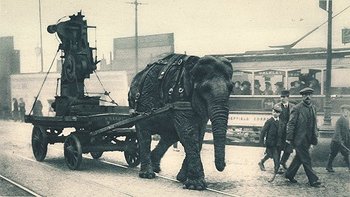World War One: The circus animals that helped Britain

Lizzie the elephant became a regular sight on the streets of Sheffield during World War One.
As World War One raged,
the military purchased most of England's horses and sent them to the
Western Front. Many farmers and traders had to find alternative beasts
of burden, but none more exotic than elephants.
On the cobbled streets of industrial Sheffield an Indian elephant dutifully lumbered along.
Her task was important - she had
to cart munitions, machines and scrap metal around the city, a job
previously done by three horses taken off to war.
Lizzie - as she was known - was used to performing tricks as part of a travelling menagerie.But with the outbreak of World War One she was conscripted to help with heavy labor, fitted with a harness and sent to work at a scrap metal merchants.

Elephants as war workers
Surprisingly elephants were used during WW1 as military auxiliaries. This image was taken in Sheffield. The elephant is providing vital help with war work and hauling 8-ton loads. Due to the lack of horses, elephants were taken from zoos and circuses during WW1 and put to work.
Surprisingly elephants were used during WW1 as military auxiliaries. This image was taken in Sheffield. The elephant is providing vital help with war work and hauling 8-ton loads. Due to the lack of horses, elephants were taken from zoos and circuses during WW1 and put to work.
However, she was not the only exotic animal working in Britain.
Camels, most probably from the same menagerie as Lizzie, were also used in Sheffield to pull heavy loads.
And in Surrey, elephants from a nearby circus filled-in for absent horses, ploughing fields and transporting hay.
But how useful were these circus animals to the war effort? And what did people in rural and industrial Britain make of their new co-workers?
Horses bore the brunt of much of the heavy work during World War One, including pulling artillery
The Word's Fair newspaper first chronicled Lizzie's appearance
in February 1916, noting the "great dearth of carting facilities in
Sheffield" had led to her being "pressed into service" from Sedgewick's
menagerie.It read: "Last week it was seen striding along with ease drawing a load of iron to a munition works.
"The weight of the load was equal to that usually allotted to three horses.
"Some passing horses were startled by this unexpected 'dilution' of their labor, and sniffed and shied as the elephant passed."
According to Sheffield amateur
historian, author and illustrator, Clare Trowell, it was not known how
she wound up at Tommy Ward's, a ship breakers and scrap metal merchant
in the city.
"By 1916 most of their heavy horses had gone to the front," she said."Lizzie was an Indian elephant, intelligent and trainable - she would've been used to people because she was part of a menagerie.
"She would've have been traipsing up and down the streets where people lived, it would've been an odd image.
"She was quite a character - there's a story about her putting her trunk into somebody's window and stealing their dinner."
Lizzie was given a special pair of leather boots to protect her feet from the metal rubbish, which littered the ground at the scrap metal yard.
Little is known of her fate after the war, however, an expression "done up like Tommy Ward's elephant", which was used when somebody was carrying something heavy, has survived in the area.
There is also some evidence that she went on to work at a farm where the ground was more forgiving.
And it was this type of work that a group of elephants in the town of Horley, in Surrey, performed during the war.

Elephants from Sangar's Circus were used to plough fields in Surrey
"They were heavy animals and would have been very useful pulling ploughs and carrying stuff."
The Horley elephants were from Lord Sanger's Circus, which based itself in the area, when not travelling around the country.
They were used during the war to plough fields in the area and transport agricultural loads around farms.
"They were used for a practical purpose, but it was probably a good bit of publicity for the circus too," said Mr Reid.

During World War I, elephants pulled heavy equipment. This one worked in a munitions yard in Sheffield.
Now that is something I NEVER knew! ... cm
I had never heard of that, but it makes sense.
ReplyDeleteSo many stories out there, Gorges! My piles of books are getting higher and higher - gotta stay off the computer once in a while and catch up on my reading.
DeleteVery interesting....I hadn't heard of this either.....at least not that I can remember.
ReplyDeleteMe either. There were several elephants that were used apparently.
Delete